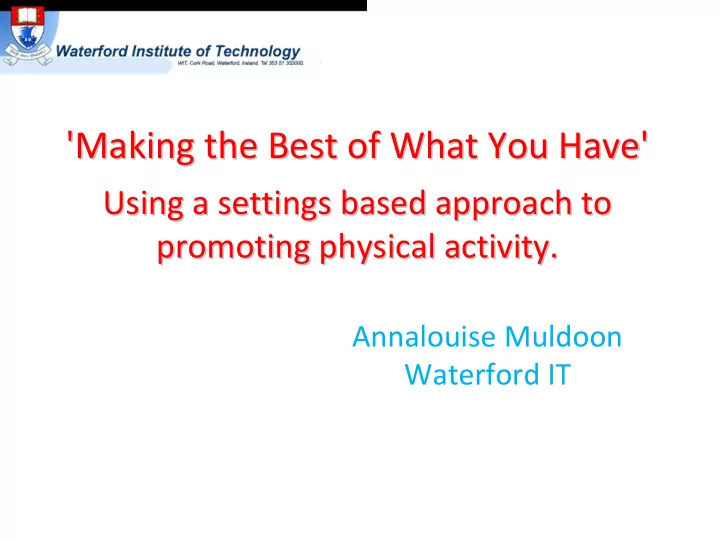

'Making the Best of What You Have' 'Making the Best of What You Have' Using a settings based approach to Using a settings based approach to promoting physical activity. promoting physical activity. Annalouise Muldoon Waterford IT
Background • There is well documented evidence between physical activity (PA) and mortality (Type I evidence)
• Established effective strategies to instigate increases in PA (Type II Evidence)
Background • Absence of Type III Evidence • Lack of effective methods for or examples of dissemination of interventions into community/real life settings • Lack of context specific, easily transferrable, successful interventions to assist dissemination
‘Making the Best of What You Have’ • Examples of research conducted by staff in the Department of Health, Sport and Exercise Science in Waterford Institute of Technology (WIT) to promote increased physical activity in a variety of population groups with an emphasis on using existing resources. • Women’s Mini Marathon – Aoife Lane and Niamh Murphy • Waterford Active Schools Programme (WASP) – Niamh Murphy, Annalouise Muldoon and Aoife Lane. • Leg it to Loreto – Barry Lambe and Niamh Murphy.
Women’s Mini Marathon • Participants in Dublin and Cork 2008 Mini Marathon contacted prior to the event and three months post event to assess their PA levels (IPAQ) • Final matched sample of n=3,853
Characteristics of Participants • 60% were repeat participants, 60 ‐ 70% primarily walked the 10km route • Approximately 60% did some training for the event • 37% were high active at baseline, as per IPAQ categories (Bauman et al., 2009)
PA Behaviour of Participants • Women’s Mini Marathon was a useful PA promoting strategy but not all participants maintained increased PA levels post event (relapsers) • Some never reached sufficiently active status • Relapsers were the target group for the intervention.
Local Sports Partnerships (LSPs): national network of PA/sport promoting agencies supported by the Irish Sports Council Involved in building partnerships, sports development, coach education Less than a third of their time is actually allocated to promotion of PA, 82% cited it as a major challenge
Intervention Outline Week Intervention 1 Information Packs: training plan, event registration/detail, stage matched PA booklets, tailored information sheets
Cluster specific Local opportunities for PA Training groups Leisure centre details, fitness classes Walking/cycling routes and clubs
Summary of Evaluation of the Intervention • Reach o successful recruitment of typically hard to reach groups (less educated, older, rural participants, parents) • Effectiveness o Significant increase in vigorous intensity activity in intervention group only o 78% of participants indicated their awareness of LSPs increased
Effectiveness a = All data adjusted for cluster effects * p < 0.05 Baseline v Pre Intervention, † p < 0.05 Pre v Post Intervention ‡ p < 0 05 Baseline v Post Intervention
Summary of Evaluation of the Intervention • Adoption/Implementation o Successful co ‐ operation and engagement with PA promoting agencies o 65% used pedometers, 38% used walking/running routes, 20% attended exercise classes o 7 ‐ 8% contacted Meet and Train groups and LSPs
Maintenance • Engagement with LSPs to improve their communication strategies and efforts to promote PA • New physical activity resource/information website, dissemination of research using factsheets
Waterford Active School Programme ‐ WASP • Designed and implemented by the staff in Waterford Sports Partnership (WSP). • The aims was to increase awareness in families of the importance of being active and making activity a natural part of daily living resulting in families being more active, more often. • The programme was evaluated by the staff of WSP in collaboration with staff from WIT.
WASP Programme • Four week intervention o Children are encouraged to accumulate 60 mins of moderate ‐ vigorous PA (MVPA) for 5 days a week o Parents are encouraged to accumulate 30 mins of (MVPA) on 5 days of the week. • Activities were recorded on a record card and the teacher awards a sticker for both child and adult once the target was reached.
Support Resources
Children’s Physical Activity Levels
Over 80% of the children enjoyed the WASP programme Children’s favourite aspects included: • doing the activities (72.7%), • getting fitter (60.6%) • 54.5% liked being active with their parent/guardian. 63.4% reporting that they did more activity to collect the Wizzy stickers.
• On going intervention • Well received by schools, children and parents. • Raises awareness of the LSPs and what they have to offer.
Active Travel in Secondary Schools • Part of a larger Active Travel study in the area linked the Smarter Travel programme. • Research suggests that both children and parents are more open to cues about active transport when they move to new environments or engage with new organisations. • Active travel to school is an ideal opportunity to increase incidental activity, particularly in girls • Intervention taking place in 2 girls secondary schools in county Kilkenny.
The Intervention Intervention School Control School (High Intensity) (Low Intensity) December 2011 3 student focus groups March 2012 March 2012 Physical activity and active travel Physical activity and active travel survey survey April 2012 ‐ 2013 September 2012 Intervention Generic PA promotion week in the Phases 1+2 school May 2013 May 2013 Physical activity and active travel Physical activity and active travel survey survey
Some lessons learned already…. Higher Level Principles Lower level principles
Overall Findings • Going towards the CUSAI Mass participation event remember: • Mass participation events have potential to increase physical activity. • Raising awareness of low physical activity levels is a crucial step in making the least active, more active. • Successful collaboration with PA agencies and use of existing resources, • Identifying a champion and getting management support are key elements in the success of any event.
Thank you for your attention
Contact Details • Annalouise Muldoon – amuldoon@wit.ie • Aoife Lane – alane@wit.ie • Niamh Murphy – nmurphy@wit.ie • Barry Lambe – blambe@wit.ie
Recommend
More recommend